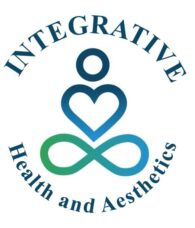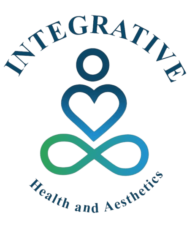Acne is a common condition that causes blocked pores, pimples, cysts and other lesions on the skin of the face, neck, chest, back, shoulders and upper arms. Although teenagers are often affected, adults of any age can suffer from acne. Acne is not life-threatening, but can lead to physical disfigurement and emotional distress. There are several effective treatment methods that improve the skin's appearance and prevent future breakouts.
Causes of Acne
Each treatment regimen revolves around addressing the causes of your acne. The four main treatment pathways address:
• Sweat gland function
• Acne causing bacteria
• Inflammation
• Rate at which skin cells turn over
Remedies include topical and oral medications in addition to in office procedures. We look for results by using many approaches simultaneously to address different ways acne can develop.
Acne Products
At Integrative Health and Aesthetics, we treat all different kinds of acne including blackheads and whiteheads, inflammatory papules, pustules, and nodules. Depending on the severity and type, we treat lesions differently. However, all treatments follow some general principles.
There are four main pathways that lead to acne lesions and we often choose overlapping modalities for additive benefits. The most common topical therapies include:
• Salicylic acid
• Azelaic acid
• Benzoyl peroxide.
These agents are present in many facial cleansers. We can use them in higher strengths for spot treatment.
The next class of medications include topical and oral antibiotics which specifically target bacteria that may be causing acne. We utilize topical and oral tretinoin for their exfoliation and anti-inflammatory properties. These treatments target 3 out of 4 of the common pathways to acne development.
Topical retinoids are typically first line treatment for acne. Be careful when choosing a topical retinoid. This active ingredient is not stable. Over the counter versions may or may not contain an active retinoid by the time it reaches a consumer.
Lifestyle and Acne
Other than medications, patients can make some lifestyle changes to reduce acne lesions. Known associated factors include skin trauma, diet (lifestyle), stress, hormonal imbalances, insulin resistance and body mass index. Skin trauma as a result of picking at lesions can irritate the skin and lead to an inflammatory response. This can lead to significant scarring and permanent damage.
Several studies suggest diet can play a role in acne formation. Studies have shown an association between milk and high sugar intake and acne. Insulin resistance and body mass index may also be associated with acne. These studies are small so there is still uncertainty surrounding these associations. Gut health is another component which impacts acne. At Integrative Health and Aesthetics, we recommend a functional approach to Acne and help your body from within to help clear the acne on the skin surface (outside). Customized probiotics would be helpful with gut health as well.
Laser Facials, Peels, and RF Microneedling for Acne
There a many in office procedures that are beneficial to treating acne. Chemical peels are one of the most commonly utilized treatments. Chemical peels not only help with current acne but also improve skin pigment and reduce signs of ageing (a win-win). When used in combination with retinoids, there can be a synergistic improvement.
Laser treatments can improve acne lesions and scarring. Researchers believe that the light from the lasers can help reduce activity of the sebaceous gland. The light is also powerful enough to kill acne causing bacteria. Laser treatments can also correct scarring from previous acne.
While not a treatment for active acne, Radiofrequency microneedling is an excellent treatment for acne scar recovery.
How to Prevent Acne
There are some general skin care guidelines we encourage patients to follow to promote resolution and prevention of acne. We recommend gentle skin cleansers that ideally keep the skin at a balanced pH to help prevent irritation and dryness.
We also recommend gentle massage as opposed to aggressive scrubbing to avoid repetitive mechanical trauma. This can induce new lesions. Tea tree oil is a natural topical agent showing promising effects in reducing acne lesions. However, results in studies took longer compared to standard of care treatments.
Finally, reducing stress, balancing hormones and improving your gut health can reduce the frequency and severity of acne break outs.
Your Partner in Skin Care
Treating acne can be frustrating. The process can take two to three months of consistent treatments and in-office procedures. Not to mention long-term maintenance treatment is often necessary. One rarely cures acne, more often we manage it.
You may need special consideration for your acne treatment. For example, pregnant patients should not use retinoids. So, our approach may differ depending on the extent and severity of lesions.
Another special scenario is treating patients with hormonal acne. Hormonal acne often requires a prescription oral medication.
Acne is a complex skin care condition requiring multiple treatment options. We offer our patients top of the line skincare products and treatments to control and manage their skin care concerns.
To learn more about our acne treatments, book a free consultation with one of our skincare specialists. We look forward to seeing you and being on your journey to more confident, flawless skin.


